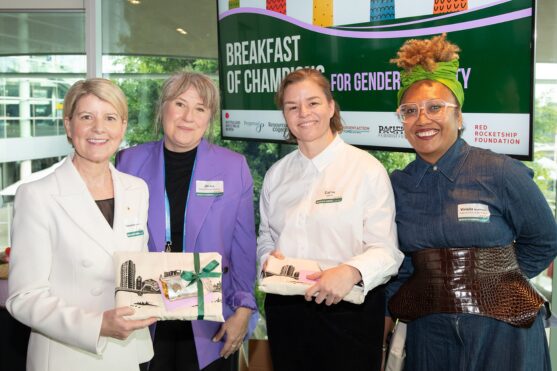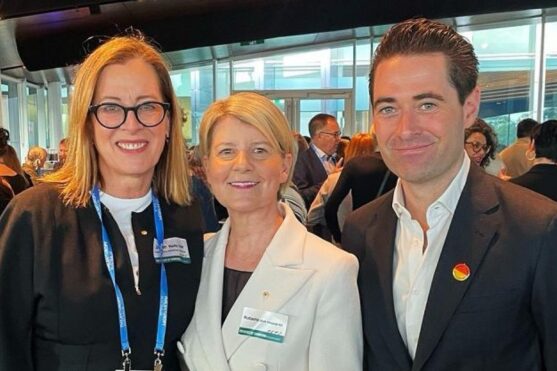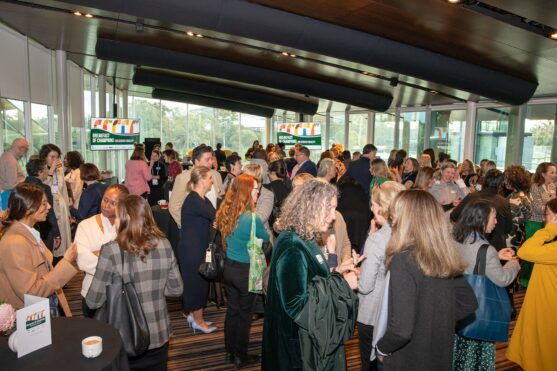Why we can’t wait 300 years for gender equality

One theme emerged with crystal clarity at the Breakfast of Champions for Gender Equality event at the Philanthropy Australia Conference: the urgent need for collective action to accelerate progress towards gender equality. The event was co-hosted by Australians Investing in Women, Perpetual, Philanthropy Australia, the ResourceFULL Collective (International Women’s Development Agency, Pacific Feminist Fund and Urgent Action Fund – Asia & Pacific) and Red Rocketship Foundation.
In the face of growing backlash against women’s rights globally, guest speakers Natasha Stott Despoja AO, Royal Commissioner for the South Australian Royal Commission into Domestic, Family and Sexual Violence and UN CEDAW Member, Cat Fay, Managing Partner at Perpetual and Virisila Buadromo, Co-Lead of Urgent Action Fund – Asia & Pacific, emphasised the critical role that collective action in philanthropy can play in advancing gender equality. The speakers are photographed above left to right, with Jo Kirk in purple.
Natasha echoed the UN Secretary-General António Guterres’ warning that, at our current pace, it would take 300 years to achieve global gender equality. She emphasised that, while progress has been made in Australia and around the globe, “the backlash is real” and illustrated this point with examples including the rollback of sexual and reproductive health rights in the US, gender apartheid in Afghanistan, and girls being poisoned for simply going to school in Iran. She called on philanthropic leaders to become vital stakeholders in the movement for gender equity, saying: “We can’t let conflict, COVID-19 or a lack of government and political will hold us back from progressing equality.”
Virisila referred decades of research that has consistently shown we need to invest in movements as levers for change, and in the rights of women, girls and non-binary people as fundamental and non-negotiable in order to achieve true equality. She called on the ecosystem of gender equality champions, including philanthropists, to harness their collective strengths, and to be “waves of change, crashing and eroding the shores of gender inequality… some as tidal waves, and others in a gentle tide of transformation”.

Cat reminded the room that in Australia we are “standing at the precipice of significant change and that an impending $3 trillion intergenerational wealth transfer –75% of which will be inherited by women –presents a unique opportunity for philanthropy to take hold of”. She stressed that the shifting wealth not only provides a chance for financial redistribution, but also an imperative to shift power and confront systemic inequalities.
Speakers were united in their call for philanthropy to shift perspectives and shift practices and to adopt transformative giving programs, asking philanthropists to critically examine their decision-making processes and incorporate an intersectional gender-lens to strategies.
“It is not just about donating money, it is about empowering women and girls through sustained, equitable, trust-based and meaningful investments,” Cat Fay said. Several practical tips for those looking to shift their giving practices towards advancing equality and supporting better outcomes for women, girls and non-binary individuals were provided. Donors and grantmakers in the room were advised to be transparent about their commitment to gender equity and to engage openly with organisations about their core funding strategies. By simply asking questions such as “how does your work intentionally support better outcomes for women, girls and non-binary individuals?” impactful refinements to program design and funding practices can be made.
Speakers agreed that the urgency of this moment calls for an inclusive approach that harnesses the power of diverse stakeholders – government, business, philanthropy and civil society. They noted that young activists and community leaders express a fervent desire for change and their energy is a powerful force that is driving transformative initiatives. Their active participation in advocacy efforts signals a bright hope for the present and future – that sees active support for gender equality and equity transcending traditional boundaries.

In closing the event, Cathy Scalzo, Interim Chair of Australians Investing in Women and CEO of Scalzo Family Office, recognised the diversity of the group in the room. “We all come to this issue with different experiences and perspectives and it’s wonderful to see so many brilliant people here, all working to move us in the same direction towards gender equality,” she said. She invited guests to consider the ways in which we can we co-create a better world, and that a commitment to gender equality is a commitment to a better world for all.
To quote Philanthropy Australia’s CEO Maree Sidey: “Philanthropy is not merely a pastime for the privileged, it is a vital component of a strong democracy and a crucial force for social good.”
Those involved in the event call on philanthropy to act boldly and invest in women and girls and lead our communities toward a more equitable and prosperous future. Collectively, we can reshape our reality and build a world where gender equality is not a goal with a 300-year timeline but a lived reality that better supports the potential and wellbeing of more than half of the global population, for the benefit of all.
Below are some resources designed for the philanthropic sector in support of gender-equality:
- Australians Investing In Women: Gender-wise Philanthropy Research and Resources
- Perpetual: Philanthropy
- Philanthropy Australia, Women’s Giving and Philanthropy, 2024
- ResourceFULL Collective: Principles of Gender-transformative Giving in Australian Philanthropy, 2024
- She Gives: Behind She Gives: A campaign to celebrate, share and inspire women’s giving in Australia, 2024